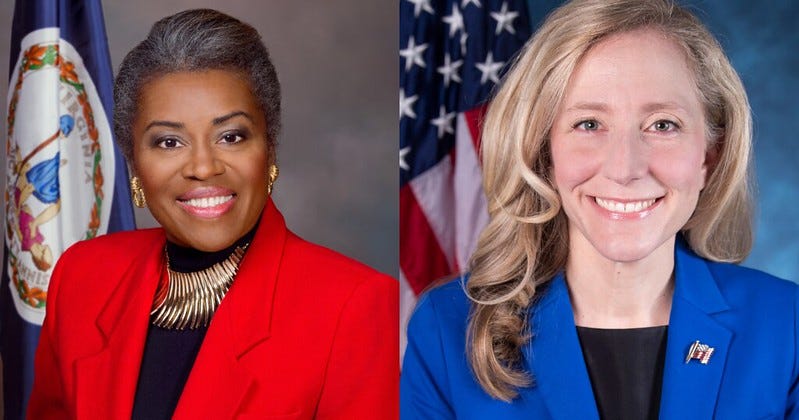ANALYSIS: The Next Governor Has A Generational Opportunity to Re-set Education
And the opportunity is coming courtesy an Oklahoma education leader.
By Martin Davis
EDITOR-IN-CHIEF
Email Martin

With Labor Day — the time when voters actually start paying attention to November elections — just around the corner, here are some notable high-level takeaways for the governor’s race.
Campaign
Abigail Spanberger’s campaign is firing on all cylinders, with detailed plans for education, economic development, and making life more affordable publicly available.
Winsome Earle-Sears’ has struggled to get her campaign off the ground, dismissing her campaign manager in July, struggling to manage her relationship to Donald Trump, and offering less-detailed plans for how she would govern.
Polling
The most recent polls show a significant lead for Spanberger. Further, the crosstabs show the economy is driving voter concerns, regardless of political party. In short, Trump’s federal firings, on-again-off-again tariffs, and looming cuts to key social safety-net programs are causing Virginia families real pain.
Fundraising
This isn’t even close. Spanberger is crushing her opponent both in cash on-hand (3-1 advantage) and money raised (more than a 2-1 advantage).
Simply put, at this moment, the election is Spanberger’s to lose. Still, there’s a long ways to go.
The candidate who comes out ahead on Election Day, however, will have to quickly shift from campaign mode to governing mode. And when they make that shift, the new governor will have a once-in-a-generation opportunity to radically remake education in the commonwealth.
An Unlikely Assist
Oklahoma’s Education Superintendent Ryan Walters is in many ways the posterchild for destroying public education. He has pushed for book bans, moved to require teaching the Bible as a religious text in schools in direct violation of the 1st Amendment, undercut education professionals in favor of parents, and worked to strip public schools of funding in order to stand up religious charter schools and other alternative educational options.
As anti-public education as Walters has shown himself to be, however, his latest action has the potential to free public schools to reinvent themselves so that they can begin to restore academic rigor and integrity to public education.
In an announcement last week, he declared that the state will end “traditional statewide summative testing” and “allow districts to use approved benchmark assessments.”
The change is radical, and a rebuke of education policy in this country that was ushered in by the No Child Left Behind Act.
Assuming the federal Department of Education approves this action — a move that is widely expected to happen — expect other states to follow suit.
To be sure, ending state-mandated testing is rife with risks. And in Republican-leaning states bent on destroying public education, it doesn’t take a lot of imagination to see what will likely happen.
But teachers, who overwhelmingly have had to live with the devastating impacts that standardized testing have brought to their classrooms, understand the opportunity before them.
Removing statewide tests would allow public schools the freedom to innovate for the students that they serve. What would work well for students at Caroline High School may not work as well for those in Stafford County high schools. Top-down standardized tests don’t allow for such curricular diversity.
Virginia Could Lead the Way
The new governor has an opportunity to reinvent education in Virginia. Eliminating statewide exams would remove shackles that have prevented public schools from innovating for the past quarter century.
Based on Winsome Earle-Sears’ public-facing education plan, it’s very difficult to know whether she would be open to this idea, and what she would do if she followed Oklahoma’s lead.
Her campaign website’s statement on education is limited to this — “empower parents to choose the best school for their children so every child gets a quality education. She will prioritize parents’ rights and basic reading and math skills over ideological grandstanding.” (A more nuanced look at Earle-Sears’ position is provided by Brandon Jarvis.)
Spanberger, by comparison, offers more detailed thoughts about both education and economics that could potentially benefit from dropping statewide high-stakes testing in favor of new approaches to assessing student progress and holding schools accountable.
Consider:
Spanberger promotes standing up an Office of Public School Innovation that grows “accessible, evidence-based programs shown to improve student outcomes and prepare students for the 21st century workforce — particularly for underserved schools.” Standardized exams place the emphasis on underperforming students and the supports necessary to raise their scores, but offer no incentives for schools that are working with students who are already succeeding. Removing those tests allows the state to target and tailor needs by school. Clint Mitchell in Spotsylvania is creating a model for this by classifying schools in the county by tiers so the county can target needs by school through an Office of School Performance and Core Curriculum.
Spanberger also promotes boosting apprenticeship programs for middle- and high-school students that lead to full apprenticeship programs. Abandoning statewide exams creates more maneuverability within the curriculum requirements for developing these programs.
These are but two points, but they show how removing statewide high stakes permits public schools to become more innovative in their offerings, and allows the state to target money where it will have the greatest impact as opposed to big-spending programs aimed at targeting programs at a statewide level. The hundreds of millions spent on reading and math recovery, for example, have failed to move the needle. Targeting students and schools who need this, while shuttling funds to address other needs holds the promise to be more effective.
Putting Politics Aside
The education wars have fallen into predictable patterns. Generally speaking, conservatives emphasize “competition” as the fix for what ails education. Progressives tend to press for credentialing professionals and whole-student support.
The reality is that both poles have a piece of the solution.
The next governor must recognize that high-stakes testing has failed public education, and in fact has become the hammer of choice to pummel the system that has played a key role over the past two centuries in making the U.S. a leader in K-12 education.
The next governor won’t fix all the problems in a four-year term, of course. But removing the high-stakes exams, unleashing teachers to innovate and meet their students’ needs as they see fit, and transitioning assessments from being a political football with which to berate public education to being a tool for honestly assessing progress and finding solutions would set Virginia on a path to being the leading education state in the nation.
Local Obituaries
To view local obituaries or to send a note to family and loved ones, please visit the link that follows.
Support Award-winning, Locally Focused Journalism
The FXBG Advance cuts through the talking points to deliver both incisive and informative news about the issues, people, and organizations that daily affect your life. And we do it in a multi-partisan format that has no equal in this region. Over the past year, our reporting was:
First to break the story of Stafford Board of Supervisors dismissing a citizen library board member for “misconduct,” without informing the citizen or explaining what the person allegedly did wrong.
First to explain falling water levels in the Rappahannock Canal.
First to detail controversial traffic numbers submitted by Stafford staff on the Buc-ee’s project
Our media group also offers the most-extensive election coverage in the region and regular columnists like:
And our newsroom is led by the most-experienced and most-awarded journalists in the region — Adele Uphaus (Managing Editor and multiple VPA award-winner) and Martin Davis (Editor-in-Chief, 2022 Opinion Writer of the Year in Virginia and more than 25 years reporting from around the country and the world).
For just $8 a month, you can help support top-flight journalism that puts people over policies.
Your contributions 100% support our journalists.
Help us as we continue to grow!
This article is published under Creative Commons license CC BY-NC-ND. It can be distributed for noncommercial purposes and must include the following: “Published with permission by FXBG Advance.”














